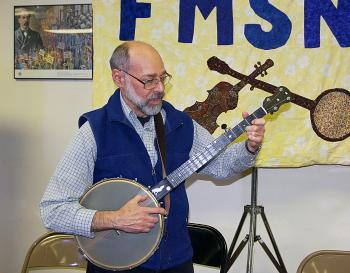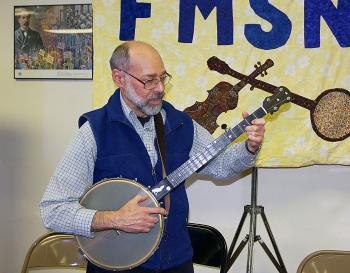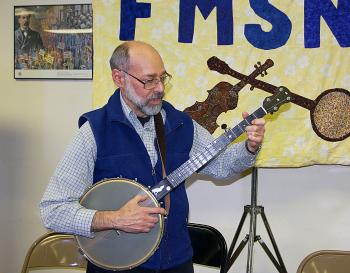NEW YORK—Members of the Folk Music Society of New York (FMSNY) got together Friday night on East 23rd Street to celebrate the life of journalist and musician Daniel Pearl, who was killed by terrorists in Pakistan four months after the Sept. 11, 2001, terrorist attacks. Pearl, who would have celebrated his 47th birthday on Oct. 10, played in bands all over the world, using music to connect with people of different cultures.
The Daniel Pearl World Music Days initiative, which is now in its ninth year, includes participation of more than 6,000 performers in 105 countries, according to the organization’s website. The commemorative concerts run from Oct. 1 through Oct. 31 and are centered around the theme of “Harmony for Humanity.” Some big-name acts, including Elton John and R.E.M., serve as the honorary committee artists for the musical tribute, and the program has also been recognized by President Barack Obama.
The FMSNY has participated in this international musical celebration for three years. This year, the Daniel Pearl World Music Days Concert in New York City revolved around the theme “Songs in Every Tongue.”
“Music can bring us together. Music transcends boundaries of language, of faith, of anything,” said Heather Wood, treasurer and program chair for FMSNY. “Through our music, we reaffirm our conviction that humanity will triumph and harmony will prevail.”
The concert was more of a gathering than a formal performance. A group of 40 to 50 people came together to share songs they'd learned while traveling and to teach others short songs in many different languages—from Galician to Patois and Hindi.
Rosalie Friend, an FMSNY member since the late 1960s, shared a Swahili song she picked up in Tanzania, which is sung to welcome foreign visitors.
“Swahili is the language of the east coast of Africa, mixed from African dialects and Arabic,” Friend explained. “It’s the national language of Tanzania, so that the people of Tanzania, who speak 120 or so tribal languages, can all learn Swahili and speak with each other.”
The song transcends boundaries between African tribes and is indicative of an increasingly shared global culture. People from all over the world can understand a phrase included in the song that has been made popular by Disney’s The Lion King—“Hakuna matata,” which means “no worries for the rest of your days,” according to the animated film’s characters Timon and Pumbaa.
The Daniel Pearl World Music Days initiative, which is now in its ninth year, includes participation of more than 6,000 performers in 105 countries, according to the organization’s website. The commemorative concerts run from Oct. 1 through Oct. 31 and are centered around the theme of “Harmony for Humanity.” Some big-name acts, including Elton John and R.E.M., serve as the honorary committee artists for the musical tribute, and the program has also been recognized by President Barack Obama.
The FMSNY has participated in this international musical celebration for three years. This year, the Daniel Pearl World Music Days Concert in New York City revolved around the theme “Songs in Every Tongue.”
“Music can bring us together. Music transcends boundaries of language, of faith, of anything,” said Heather Wood, treasurer and program chair for FMSNY. “Through our music, we reaffirm our conviction that humanity will triumph and harmony will prevail.”
The concert was more of a gathering than a formal performance. A group of 40 to 50 people came together to share songs they'd learned while traveling and to teach others short songs in many different languages—from Galician to Patois and Hindi.
Rosalie Friend, an FMSNY member since the late 1960s, shared a Swahili song she picked up in Tanzania, which is sung to welcome foreign visitors.
“Swahili is the language of the east coast of Africa, mixed from African dialects and Arabic,” Friend explained. “It’s the national language of Tanzania, so that the people of Tanzania, who speak 120 or so tribal languages, can all learn Swahili and speak with each other.”
The song transcends boundaries between African tribes and is indicative of an increasingly shared global culture. People from all over the world can understand a phrase included in the song that has been made popular by Disney’s The Lion King—“Hakuna matata,” which means “no worries for the rest of your days,” according to the animated film’s characters Timon and Pumbaa.








